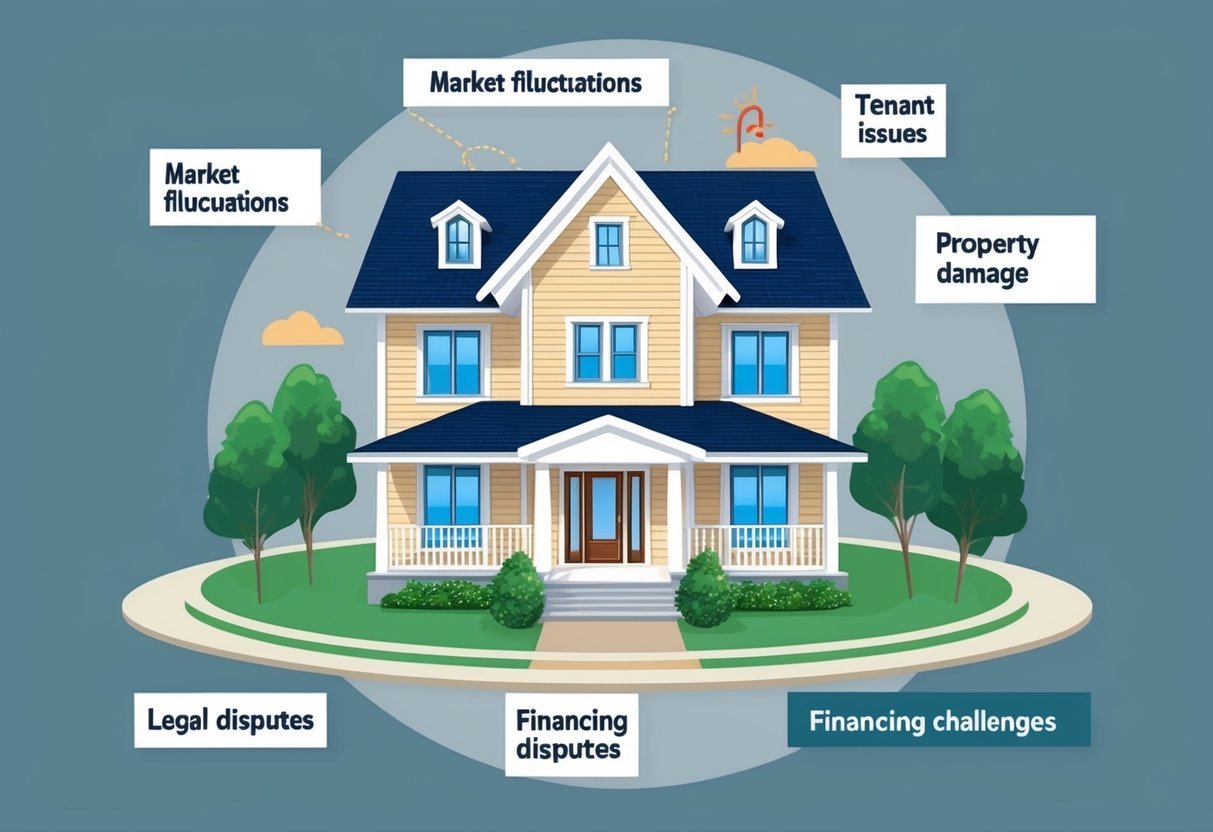In the world of real estate investing, understanding the landscape is crucial to our success.
Navigating the various challenges that come with property investment can be daunting, yet it presents opportunities for growth and profitability.
By equipping ourselves with the right knowledge, we can make informed decisions and enhance our investment strategies.

How can we safeguard against the potential pitfalls inherent in real estate ventures? By identifying key risks and employing effective risk management techniques, we can protect our investments and ensure sustainable returns.
This exploration will guide us through the common risks in real estate investing and discuss ways to mitigate them, empowering us to strengthen our portfolios with confidence.
1) Market Fluctuations – Research and Stay Informed
In the real estate market, fluctuations are a reality we must be prepared to navigate.
These changes can impact property values and rental income significantly.
To mitigate these risks, we need to engage in thorough and ongoing research.
Keeping abreast of market trends is crucial.
By staying informed about economic indicators and housing market developments, we can make informed decisions.
Regularly consulting reliable sources and analytical reports helps us anticipate changes and react accordingly.
It’s also important to consider regional variances.
Real estate markets can behave differently depending on location.
By understanding local market dynamics, such as employment rates and new developments, we gain valuable insights that can inform our investment strategies.
Visiting potential investment areas in person allows us to get a firsthand view of local conditions.
This direct engagement provides context that data and reports alone might not capture.
Observing neighborhood characteristics and growth patterns can be instrumental in gauging future potential.
Rebalancing our portfolios regularly is another effective strategy.
By adjusting our investments in response to market shifts, we ensure that our assets remain aligned with the current economic environment.
This proactive approach helps in balancing risk and maintaining stable returns.
Collaborating with industry experts is beneficial.
Engaging with real estate advisors who have local knowledge and experience can enhance our understanding of market fluctuations.
Their insights can guide our decisions and help mitigate risks effectively.
2) Property Valuation Errors – Hire a Professional Appraiser

Accurate property valuation is crucial when investing in real estate.
A misstep in this area can lead to significant financial consequences.
To minimize these risks, hiring a professional appraiser is a must.
They provide an objective assessment, ensuring that we base our investment decisions on reliable data.
Professional appraisers apply tested methodologies to determine a property’s market value.
They consider factors such as location, size, condition, and comparable property sales in the area.
This thorough evaluation helps us avoid overpaying for a property, protecting our investment.
Mistakes like inaccurate square footage measurements or inappropriate sales comparisons often occur in property valuation.
Appraisers have the expertise to prevent such errors.
By employing their services, we ensure that the valuation is comprehensive and precise, aligning with industry standards.
Additionally, appraisers can provide valuable insights beyond basic valuation.
Their understanding of market trends can guide us in making informed investment choices.
With their assistance, we gain a nuanced view of the property market, empowering us to make strategic decisions.
Investing in a professional appraisal might seem like an extra expense initially.
However, it can save us money in the long run by preventing costly misjudgments.
Trusting experts in this critical phase of the investment process fortifies the foundation of our portfolio.
Given the complexities of real estate transactions, it’s essential to collaborate with qualified appraisers.
Their skills and knowledge help us navigate the myriad factors influencing property values, enabling a more confident entry into the market.
3) Legal Issues – Consult with a Real Estate Attorney

When we invest in real estate, legal complications are almost inevitable.
From zoning laws to contract disputes, navigating these challenges requires specialized knowledge.
This can be a daunting task for us as investors, highlighting the importance of seeking assistance from a competent real estate attorney.
Legal professionals help us ensure that all our transactions comply with local regulations.
They guide us in understanding the intricacies of zoning compliances and environmental regulations, which could very well impact our investment.
Without such expertise, we risk facing significant legal hurdles.
Contractual disputes are another common issue in real estate.
A real estate attorney can meticulously review contracts and agreements to protect our interests.
They ensure that contract terms are transparent, fair, and leave no room for ambiguity, thereby mitigating potential disputes down the road.
Furthermore, in complex transactions involving property acquisitions, development projects, or financing arrangements, legal experts provide clarity and guidance.
They assist us in managing due diligence, ensuring that the necessary documentation and inspections are conducted efficiently.
Real estate transactions often require obtaining various permits and approvals.
Navigating the permitting process can be complex.
Here, legal counsel can be invaluable in avoiding unnecessary delays and ensuring that all legal requirements are met.
Their assistance helps us proceed with confidence and clarity.
Engaging a real estate attorney not only safeguards us from legal ramifications but also empowers us to make informed decisions.
In the ever-evolving world of real estate investing, having experienced legal counsel on our side is not just beneficial—it is essential.
Financing Challenges – Secure Pre-approved Loans

Navigating the financing landscape in real estate can be daunting.
One of our main hurdles is securing loans with favorable terms.
Due to fluctuating interest rates and stringent lender criteria, it’s vital to be prepared.
This is where pre-approved loans come into play.
By obtaining pre-approval, we can streamline our property search with clear budgetary limits.
Pre-approval signals financial readiness to sellers and puts us in a strong negotiating position.
It also helps us act quickly when we identify an ideal property.
Our financial profile plays a significant role in getting pre-approved.
We should ensure our credit score is robust and our financial documents are up to date.
Lenders scrutinize these details thoroughly, making it essential for us to maintain solid financial records.
Pre-approved loans not only provide clarity but also save time during the buying process.
By having a clear understanding of our borrowing capacity, we can focus our efforts on properties within our budget.
This efficiency can be a significant advantage in competitive markets.
Additionally, we should engage with multiple lenders to compare available options.
Each lender may offer different rates or terms, so shopping around allows us to secure the most favorable deal.
This diligence is crucial in ensuring our investment is as cost-effective as possible.
5) Tenant Problems – Conduct Thorough Background Checks
Tenant problems can significantly impact the success of our real estate investments.
Late payments, property damage, or legal disputes can lead to financial strain and stress.
To mitigate these risks, we must prioritize conducting thorough background checks.
When evaluating a prospective tenant, we should begin by verifying their credit history.
This gives us insight into their financial responsibility and ability to meet rent obligations.
A solid credit score suggests reliability, while a poor score may warrant closer scrutiny.
In addition to credit checks, it’s crucial to examine rental history.
Contacting previous landlords can provide valuable information about a tenant’s behavior, payment patterns, and any issues that may have arisen during their tenancy.
This helps us identify potential risk factors.
Employment verification is another critical step.
By confirming a tenant’s job stability and income level, we ensure they have the financial means to afford the rent.
Consistent employment history often indicates a stable and dependable tenant.
Reference checks can further bolster our assessment.
Personal references can offer additional perspective on the tenant’s character, helping us gauge trustworthiness and responsibility.
While not always heavily weighted, these insights can complement information gathered from more concrete sources.
Finally, we must comply with all legal requirements when conducting background checks.
Adhering to Fair Housing laws and using approved screening methods ensures that our process is not only effective but also ethical and lawful.
Ensuring our approach is transparent and fair can protect us from potential legal issues.
Understanding Market Volatility

Market volatility in real estate can present challenges, but by examining historical trends and using predictive analytics, we can better prepare and safeguard our investments.
These strategies not only provide insights into past patterns but also enhance our ability to anticipate future shifts.
Historical Trends Analysis
By studying historical trends, we gain valuable insights into market cycles and potential future movements.
Real estate markets have shown patterns of boom and bust, often tied to broader economic conditions.
Recognizing these patterns helps us make informed decisions about buying or selling properties.
To conduct a thorough analysis, we consider factors like past property values, interest rate changes, and economic indicators.
Employing data from reliable sources ensures a comprehensive view of the market’s past behavior. Analyzing these trends enables us to adjust our investment strategies accordingly.
Predictive Analytics Tools
Predictive analytics tools offer a sophisticated means of anticipating future market changes.
By leveraging complex algorithms and large datasets, these tools provide forecasts on potential market fluctuations.
This can be crucial for determining the right time to enter or exit a market.
We utilize models that incorporate demographic shifts, economic forecasts, and consumer behavior patterns.
These tools enhance our ability to react proactively to potential risks and adjust our investment portfolio accordingly.
The incorporation of predictive analytics into our decision-making process enhances our capacity to minimize exposure to market volatility.
Property Valuation Errors

Errors in property valuation can disrupt our real estate investment plans.
Accurate valuations are crucial for decision-making and maintaining profitability.
Exploring ways to ensure accurate appraisals and leveraging professional expertise helps us minimize potential pitfalls and supports successful investment strategies.
Ensuring Accurate Appraisals
Accurate appraisals form the foundation of sound real estate investments.
We must prioritize gathering comprehensive data, including local market trends, property conditions, and comparable sales.
Utilizing technology, such as automated valuation models, can provide additional insights, yet human expertise remains indispensable.
Regularly consulting with certified appraisers ensures objectivity and precision in valuations.
It’s important to review the appraisers’ credentials and experiences, aiming to collaborate with those familiar with the local market.
Establishing clear communication ensures that appraisers understand the unique aspects of the property, leading to detailed evaluations.
Leveraging Professional Expertise
Engaging professional expertise offers significant advantages in mitigating valuation risks.
Choosing to work with experienced real estate agents can provide invaluable guidance, as they have a thorough understanding of market dynamics and property values.
Our investment strategy should include consultations with financial advisors familiar with real estate.
These professionals help in interpreting appraisal reports and assist in crafting informed investment decisions.
Additionally, legal advisors can ensure compliance with applicable regulations, reducing potential risks.
By actively incorporating professional insights, we can refine our approaches and develop more accurate valuation strategies.
This collaboration helps us to maximize returns and navigate the complexities of the real estate market effectively.
Legal and Regulatory Compliance

Ensuring compliance with legal and regulatory obligations is crucial for successful real estate investing.
This means understanding zoning laws and being aware of tenant rights to avoid potential pitfalls.
Navigating Zoning Laws
Zoning laws dictate how properties can be used in specific areas.
These regulations affect everything from residential use to commercial and industrial development.
Understanding zoning classifications helps us avoid investing in properties that cannot be developed as intended.
We must consult local zoning maps and authorities to verify the permissible uses of properties.
Engaging with experienced land-use attorneys or planning consultants can also offer valuable insights into variances or rezoning.
By doing so, we protect our investments from legal disputes and costly mistakes.
Understanding Tenant Rights
Tenant rights are vital to maintaining a fair and lawful renting experience.
Landlords are required to adhere to regulations concerning leases, security deposits, and evictions.
Ignorance of these rights can lead to tenant disputes and legal challenges.
We should familiarize ourselves with state and local landlord-tenant laws.
Keeping abreast of changes in legislation ensures compliance and fosters positive relationships with tenants.
Providing a safe and habitable environment is not just ethical but mandatory.
Therefore, staying informed about tenant rights safeguards our interests and promotes smoother property management.
Frequently Asked Questions

In real estate investing, managing various risks effectively is crucial for minimizing potential losses.
We address several common concerns by exploring financial, market, legal, and compliance risks, alongside best practices for low-risk opportunities.
What are the various types of financial risks associated with real estate investing?
Financial risks include market volatility, interest rate fluctuations, and management cost overruns.
These require careful budgeting and financial planning.
We recommend securing pre-approved loans and seeking advice from financial professionals to manage these risks effectively.
How can investors effectively reduce their exposure to risks in real estate development?
Investors can minimize risk by conducting thorough property inspections and due diligence.
It’s essential to collaborate with experienced developers and contractors.
A well-drafted contract and a comprehensive insurance policy can further protect from unforeseen issues.
What strategies can be employed to mitigate the impact of market volatility on real estate investments?
Staying informed about market trends is critical.
Diversifying investments across different property types and geographical areas can reduce exposure.
Additionally, maintaining liquidity and a flexible strategy helps adapt to changing market conditions.
In the context of real estate investing, which risks carry the most significant potential for loss?
Market fluctuations and property valuation errors present substantial risks.
These can result in significant financial loss, underscoring the need for professional appraisals and comprehensive market research.
Engaging with experienced real estate attorneys can mitigate legal risks.
Can you identify best practices for minimizing legal and compliance risks in property investment?
Working closely with a real estate attorney ensures adherence to local regulations and compliance standards.
Keeping thorough documentation and records is essential.
Regular audits can also help identify potential issues early and maintain compliance.
What are the key risk management techniques for investors targeting low-risk real estate opportunities?
Investors seeking low-risk ventures should consider stable markets and avoid speculative opportunities.
House hacking or investing in properties with strong rental demand are practical approaches.
Consistent property maintenance and tenant screening further safeguard investments.

